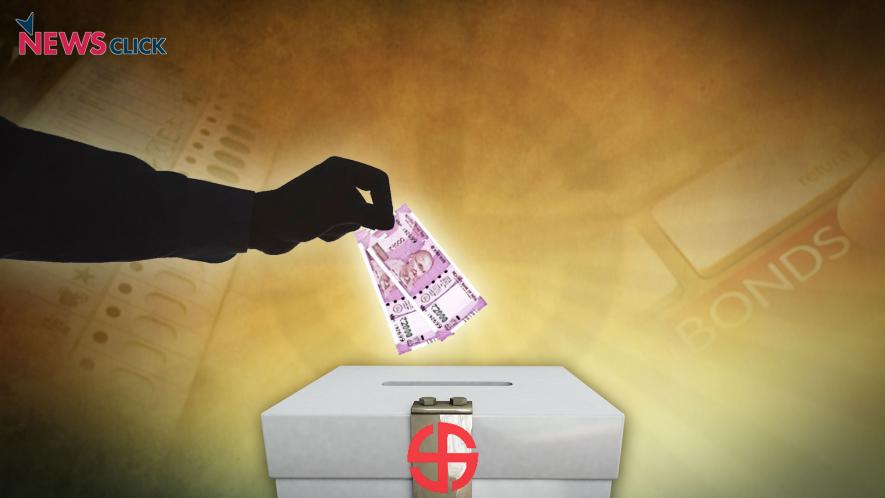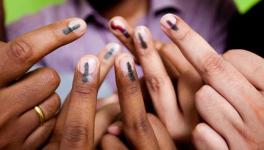Corporate Donations Dominate the Funds Disbursed to Political Parties

Newsclick Image by Nitesh Kumar
According to a report by the Association for Democratic Reforms (ADR) titled Analysis of Contribution Report of Electoral Trusts – FY 2016-17, between financial years 2013-14 and 2016-17, nine registered electoral trusts have donated a total of 637.54 crores to the political parties. Out of these nine registered Electoral Trusts, only two have donated more than twice. In 2016-17 only six registered Electoral Trusts received contributions, these trusts are; Prudent Electoral Trust, Janta Nirvachak Electoral Trust, New Democratic Electoral Trust, Samaj Electoral Trust, Paribartan Electoral Trust, and Triumph Electoral Trust.
The contributions received reveal more. Prudent Electoral Trust received the highest amount of contributions at 283.73 crores, Janta Nirvachak Electoral Trust (25 crores), New Democratic Electoral Trust (12.03 crores), Samaj Electoral Trust (4.08 crores), Paribartan Electoral Trust (0.51 crores), and Triumph Electoral Trust received the least (0.1 crores).
Of these Trusts, the two trusts which received the highest contributions transferred the lions share to the BJP. Prudent Electoral Trust contributed 88.9% of the contributions received to the BJP while Janta Nirvachak Electoral Trust transferred 100% -- 252.22 crores and 25 crores respectively. This made the BJP alone receive 89.22% (290.22 crores) of the total funds transferred, whereas the other nine parties received 35.05 crores collectively.
Of the six Electoral Trusts who received and disbursed contributions, the BJP received funds from four of them; Prudent (252.22 crores), Janta Nirvachak (25 crores), New Democratic (11 crores), and Samaj (2 crores). The INC received funds from three; Prudent (14.9 crores), Samaj (1.5 crores), and Triumph (0.1 crores). The Shiromani Akali Dal (9 crores), Samajwadi Party (6.5 crores), and Aam Aadmi Party (1 crore) received funds only from Prudent. The Shiv Sena received 1 crore from New Democratic. The All India Trinamool Congress received 0.5 crores from Paribartan. The Rashtriya Lok Dal received funds from Prudent (0.1 crore), and Samaj (0.2 crore). The Jammu and Kashmir Peoples’ Democratic Party (0.15 crores) and the Jammu and Kashmir National Conference (0.1crores) received funds from Samaj.
The report becomes more interesting if one takes a look at the list of the top 10 contributors for the financial year 2016-17. DLF Ltd. was the highest contributor at 28 crores, UPL Ltd. (25 crores), JSW Energy Ltd. (25 crores), Piramal Enterprises Ltd. (21.1 crores), Mr. Suresh A. Kotak (18.5 crores), Bharti Airtel Ltd. (17.005 crores), DLF Cyber City Developers Ltd. (15 crores), Essar Bulk Terminal Ltd. (15 crores), Ultra Tech Cement Ltd. (13 crores), Grasim Industries Ltd. (13 crores).
The data contained in the report shows that the money has come primarily from corporate entities, apart from one individual, Mr Suresh A. Kotak. The issue has been raised before as well, that corporate funds will hamper governments in carrying out their duties towards the citizens. In the ADR report, two of the seven recommendations pertained to the issue of corporates. The fifth point mentioned that the names of the Electoral Trusts do not indicate who has set them up, and hence it would be in the interest of transparency that the name of the parent company is included in the name of the trust. The seventh point mentioned that all corporates should make public their political contributions.
The report of the ADR if seen in the light of the notification in the Gazette of India: Extraordinary, on January 2, 2018 is a cause for concern. This notification pertains to the ‘Electoral Bond Scheme’ a process that was initiated in the Budget Session last year and has now materialized just before the assembly elections in Meghalaya, Nagaland and Tripura. The Electoral Bond Scheme has been pushed by the present Government as a means to tackle money laundering and ensure transparency in the electoral process. However, Section 6 (4) provides for the protection of the buyer’s identity. This is a unique position considering how the Government had sought to establish that there is no right to privacy under the Indian Constitution in the AADHAAR case.
Get the latest reports & analysis with people's perspective on Protests, movements & deep analytical videos, discussions of the current affairs in your Telegram app. Subscribe to NewsClick's Telegram channel & get Real-Time updates on stories, as they get published on our website.























